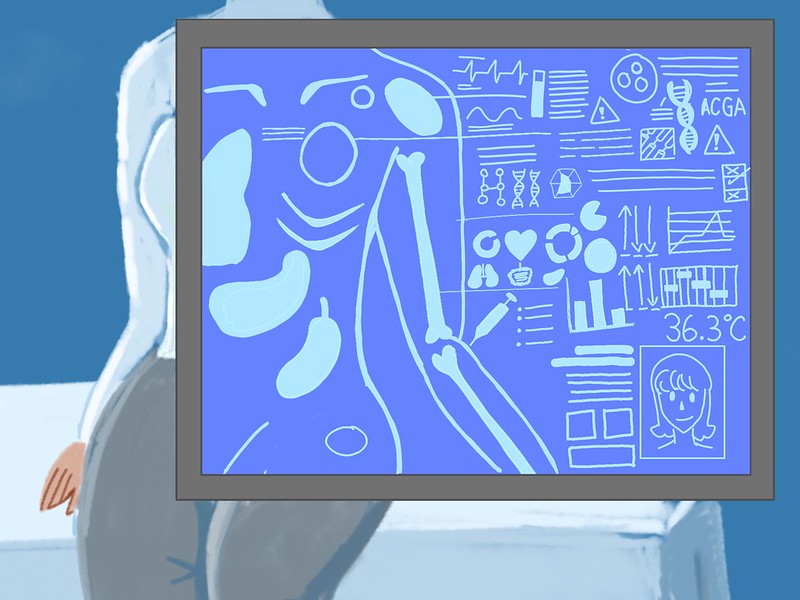Quality medical care, affordable medication and accessible healthcare are all things that one would expect all Americans to have. Reality check: it is not. For many Americans, these essential aspects of healthcare remain a constant worry.
This issue cannot be fixed within an instant, however, the rapidly-evolving technology of artificial intelligence can help alleviate some of this struggle. The guidance of AI can revolutionize the healthcare system for the better.
The American healthcare system is one that is deeply flawed and with the COVID pandemic, it became drastically affected by exacerbating health disparities, making it more difficult for Americans to receive reliable services.
Sky-rocketing prices determine if Americans choose to receive healthcare. In fact, 47% of U.S. adults report having difficulty in managing healthcare costs. Additionally, one-third of adults report that at least one household member skipped doctor-recommended treatment and 43% say they postponed necessary care due to its cost.
In addition to these issues, basic access to effective care remains a problem in the U.S. Social determinants of health, such as socioeconomic status, environment, education and access to healthcare, play a major role in health inequities, which impact people of color the most, and in turn, affects how they receive medical treatment.
With the healthcare system having its many flaws, this leaves us to bring innovative solutions. It is time that we turn to a technology that works at a faster pace than us: artificial intelligence (AI). Our healthcare system does not need to be run by artificial intelligence but it can definitely work as a helping hand—especially for healthcare providers who might not have much time on their hands.
The U.S. has the worst health outcomes among any other high-income country through the high mortality rates and the highest rate of people with multiple chronic conditions. To combat these challenges, AI can be used for early disease detection by analyzing medical images, such as X-rays and CT scans, with greater efficiency and accuracy.
In a 2019 study of evaluating AI’s diagnostic accuracy based on medical imaging, researchers found its performance to be “equivalent to that of health-care professionals.” With its skill set, AI can reduce misdiagnoses or medical errors through precision medicine, which bases the data off of the patient’s internal and external factors, such as genetics, environment and their overall medical history. Through this, personalized treatment plans can become readily available for patients, reducing the long wait times they might already face.
Although with new advancements, concerns also arise on its privacy and security. As AI is a database that can store and transmit patient data, they can also be vulnerable to cyber attacks.
However, those who design AI’s algorithms can also design it to recognize unusual patterns or behaviors to root out any threats to its system. While I am a huge advocate for using technology to improve healthcare, we also need to be careful about how we use it to safeguard privacy for both physicians and patients. Creating strict data protection services will not only build trust with patients, but also encourage improved research and development of technology and healthcare in general.
Within the field of research and development (R&D), it takes at least 10-20 years for a new drug to be developed, but AI can significantly reduce this time.
By using its own collective data, or “intelligence,” AI can be helpful lab assistants, completing tedious work. Meanwhile, researchers can focus on other aspects of their research that require more time, such as experimental design or tasks requiring dexterity. It can also help us better understand biological structures and codes and provide feedback on how the drug might work for specific populations. AI won’t replace the lab researchers, rather it can improve the efficiency and the productivity of their task.
Another concern with AI in healthcare is its ethical considerations, such as equity and biases. When designing its algorithms, researchers must keep ethics in mind to ensure equitable outcomes by inputting a large, diverse dataset to identify patterns that may have gone unnoticed by human researchers.
To mitigate the negative effects of this new technology, investing in AI research can help us discover more about what it can do. AI is not at the level of taking away human jobs, especially those in the healthcare sector, but rather than denying opportunities to improve our system, we should embrace what has already become our reality.
From what was the emerging technology of iPhones in 2007 that has now become an integral piece of our lives, to today, where AI is beginning to transform our day-to-day lives, there might never be a stop to this technological revolution. We will never truly know the power of something without testing its capabilities, but there is always the option of using it to better our world and lead us to a brighter and healthier future.








